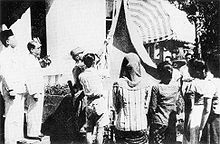Fatmawati
Fatmawati | |
|---|---|
 Official portrait, c. 1940s | |
| 1st First Lady of Indonesia | |
| In role 18 August 1945 – 12 March 1967 | |
| President | Sukarno |
| Preceded by | Title created |
| Succeeded by | Siti Hartinah |
| Personal details | |
| Born | 5 February 1923 Benkoelen, Dutch East Indies |
| Died | 14 May 1980 (aged 57) Kuala Lumpur, Malaysia |
| Resting place | Karet Bivak Cemetery |
| Spouse | |
| Children | |
| Parents |
|
| Relatives |
|
Fatmawati (5 February 1923 – 14 May 1980)[1] was a National Hero of Indonesia (Indonesian: Pahlawan Nasional Indonesia). As the inaugural first lady of Indonesia, she was the third wife of the first president of Indonesia, Sukarno, and the mother of Indonesia's first female president, Megawati Sukarnoputri. She constructed the first flag flown by Indonesia.[2]
Life
[edit]
Fatmawati was born on 5 February 1923 in Bengkulu to Hasan Din and Chadijah.[3] One of her ancestors was a princess of a Minangkabau kingdom, Sultanate of Inderapura.[4] When she met Sukarno she was a teenager and he was married to a 53-year-old woman named Inggit Garnasih. Unsurprisingly, Sukarno's wife was unwilling to release her husband but, after two years, Inggit agreed to a divorce. Sukarno rationalised the need for his new wife by stating his desire to have a child to carry on his name.[5]

In 1943, Fatmawati became the third wife of Sukarno. In 1945 she was his wife when Indonesia declared independence. The flag of the new country was sewn by Fatmawati,[2] and the same flag was flown again every year until 1967. She was not his first wife, as he had married twice before. However, all his previous wives had been divorced in accordance with state law. Fatmawati was therefore his only wife at that time.[citation needed]
Polygamy
[edit]
There was a growing movement to reform women's rights in Indonesia and part of this was to reform the marriage laws. Fatmawati was not initially in favour of reforming these laws until she found out about her husband's intentions to marry again. Moreover, this time Sukarno had decided that he did not want to divorce Fatmawati but intended to have two wives.[6]
Fatmawati objected when her husband took Hartini, his new wife, according to Muslim law. Sukarno married another woman from Java in 1953 and Fatmawati moved out of the presidential palace and lived separately in Jakarta.[7] As part of the settlement, Fatmawati was allowed to keep the title of first lady.[5] This development was a major blow to the growing women's movement. Fatmawati decided that she was going to divorce the president, but she could not find a religious leader who was willing to oppose the will of Sukarno.[6] The women's organisation consoled and advised Fatmawati and they tried to encourage her to return to the palace and reestablish her rights. Sukarno himself was annoyed by this development, although his new wife understood Fatmawati's anger.[8]
Sukarno's new wife bore him two additional children; however, Sukarno reacted badly when he heard that his latest wife had allowed a women's group to consider transferring the title of first lady to her. Sukarno returned and had her thrown out of the meeting and exiled to Bogor.[5]
In 1953 Fatmawati became concerned about the plight of children with tuberculosis. She founded the Ibu Soekarno Foundation to fund a hospital. The following year a hospital was opened with the assistance of government funding. This was called the Madam Soekarno Hospital and Fatmawati laid the foundation stone in 1954. The birth of the hospital was a long one. The construction of the new building was halted by financial problems and it was not until 1961 that the hospital opened. By that time the hospital was run by the Ministry of Health and it did not specialise in tuberculosis or children but was a general hospital. In 1967 the name was changed to the Fatmawati Central General Hospital.[9]
Fatmawati's second child, Megawati Sukarnoputri, became president in 2001.
Death
[edit]
Fatmawati died of a heart attack on 14 May 1980 in Kuala Lumpur, Malaysia, on her way back to Jakarta from an umra in Mecca.[10] She is buried in Karet Bivak Cemetery, Central Jakarta.
Legacy
[edit]Her childhood home in Bengkulu has become a tourist attraction, and lies on Jalan Fatmawati (Fatmawati Street). The city’s airport is named Fatmawati Soekarno Airport after her.[11]
Fatmawati Central Public Hospital (RSUP Fatmawati) in South Jakarta is named after her, as well as a major artery to the hospital (Jalan RS Fatmawati) and a rapid transit station (Fatmawati MRT station) nearby.
References
[edit]- ^ Tiga Putri Bung Karno Raih Penghargaan MURI Archived 20 June 2011 at archive.today
- ^ a b c MacDonald, Ian (2006). "Indonesia". Flags of the World. Archived from the original on 2 April 2010. Retrieved 13 March 2010.
- ^ "Biography of Fatmawati". Kepustakaan Presiden-Presiden Indonesia (in Indonesian). Archived from the original on 21 July 2011.
- ^ Agus, Yusuf, Sejarah Pesisir Selatan, Jakarta : PT. Arina Yudi, 2001
- ^ a b c Friend, Theodore (2003). Indonesian Destinies p.74 et al. Harvard University Press. p. 628. ISBN 978-0-674-01137-3.
- ^ a b Wieringa, Saskia (2002). Sexual politics in Indonesia p115 et al. Palgrave Macmillan. p. 390. ISBN 978-0-333-98718-6.
- ^ Geerken, Horst H (2010). A Gecko for Luck p180. BoD – Books on Demand. p. 394. ISBN 978-3-8391-5248-5. Retrieved 28 November 2013.
- ^ The women's movement in post-colonial Indonesia, Elizabeth Martyn, p137, 2005. Retrieved March 2010
- ^ History of Hospital. Retrieved March 2010
- ^ "Sukarno's Widow,56,dies of heart attack :NST Malaysia 15 May 1980"
- ^ "Fatmawati Soekarno Airport - IndonesiaAirport.com". indonesiaairport.com. Retrieved 23 December 2022.

